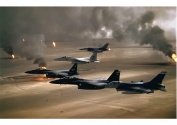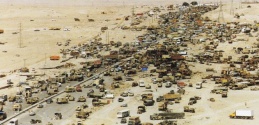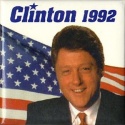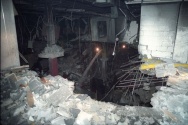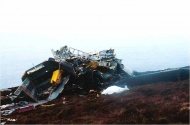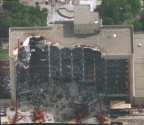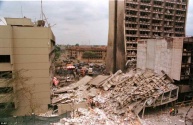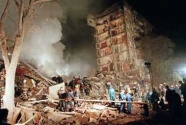1990s
| 1980s« | |
|---|---|
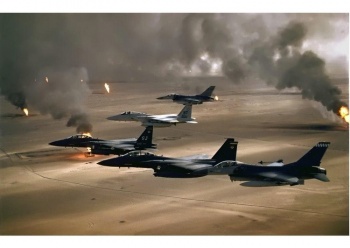 | |
| The first post-cold war decade, in which the Military Industrial complex transitioned to "Islamic terrorists" as the new enemy, complete with various acts of false flag terrorism. Nevertheless, it appears to have been unready for the rise of the internet as a many to many broadcasting system, uncensored and unregulated. |
The 1990s, as the first post-Cold War decade, were an exciting time in which hopes for a winding down of the permanent war economy were betrayed. US defence spending was at a low in and the public were looking forward to an increasing peace dividend.[1]
However, permanent war machine began to arrange incidents of "terrorism" and started to talk about increased military expenditures. Many of the large terrorist events were false flag operations. Particularly notable were the 1999 Russian apartment bombings, carried out while the FSB was under the directorship of Vladimir Putin and ascribed to Chechnyan terrorists.
Rise of the Internet
The popular misconception that the internet was invented in the 1990s[2] reflects the fact that it is synonymous with the WWW, which was invented in the 1990s. In 1996, Gary Webb's pioneering use of the WWW to break his Dark Alliance expose of CIA drug trafficking had established its feasibility as a way of avoiding deep state control of the commercially-controlled media; at the peak of its popularity, the Dark Alliance website was getting about 1,000,000 hits/day. While occasional actions were taken in response to posting on the internet (many believe that Steve Kangas' death resulted from his usenet postings) the internet was not a subject of regulation and although usage was much less than nowadays, monitoring technologies were not well developed. Until about 2000, there was a popular belief was that the internet would prove impossible to regulate.[3]
Related Quotations
| Page | Quote | Author | Date |
|---|---|---|---|
| 1989 | “The political stability of Eastern Europe will continue into the nineties.” | 1989 | |
| Eastern Europe | “The political stability of Eastern Europe will continue into the nineties.” | 1989 | |
| Russia | “Higher stakes meant aggressive mobilisation of media for an information war became a feature of 1990s electoral politics at regional level, following the pattern of the 1996 presidential election.
By then, the corruption associated with privatisation had made Yeltsin and the reformers unpopular – and many feared the communists would return to power. The democrats had to resort to desperate measures. Every possible resource was mobilised to ensure that Yeltsin was re-elected – including deals with powerful oligarchs with large media empires. The communists were defeated but the price was endemic cynicism about the democratic process. The Yeltsin presidency remained beholden to Russia’s regional governors and the oligarchs. It fell to Putin to curtail the powers of these groups, campaigning in 2000 under the slogan of “the dictatorship of law”. That such a slogan could have popular support shows the degree to which the public had become disillusioned in the late 1990s. However, the direction towards concentration of power had been set almost a decade before Putin was elected president. Russia’s reformers of the 90s largely achieved the irreversible economic change they wanted. They were less successful in creating a positive narrative for the new Russia. Reform had seemed to be based on the idea that Russia needed to learn as much as possible from the west. Over time, disillusion with this idealised view of the west grew and public opinion became more nationalistic.” | Adrian Campbell |
References
- ↑ https://www.corbettreport.com/the-real-cost-of-the-war-of-terror/
- ↑ Actually, it was invented decades earlier, but was originally used only by a rarefied community of researchers.
- ↑ http://cyber.law.harvard.edu/teaching/ilaw/2011/Summary_of_Four_Phases
